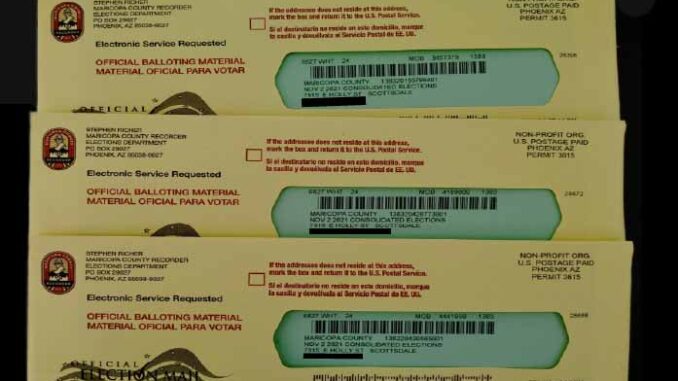
The outcome of the Arizona Republican Party’s lawsuit seeking to have the state’s current system allowing no-excuse voting by mail struck down as unconstitutional will not be challenged or appealed by the Arizona Attorney General’s Office.
That is what Brunn W. Roysden III, the Solicitor General in the Arizona and an assistant for Attorney General Mark Brnovich, informed a Mohave County judge as part of a recent filing which calls for the dismissal of the State of Arizona from the AZGOP’s lawsuit.
“As counsel for the State of Arizona, I represent and agree that the State of Arizona, which has been named as a defendant in this action, agrees to be bound by the outcome of this litigation, including any appeals, with respect to the declaratory and injunctive relief requested,” declared Roysden, who noted his duties include defending Arizona statutes which are challenged in court.
The AZGOP’s May 17 lawsuit names the State of Arizona, all 15 of the state’s elected county recorders, and Arizona Secretary of State Katie Hobbs as defendants. It asks the Mohave County Superior Court to declare no-excuse mail-in voting as being contrary to the Arizona Constitution and to ban such practices during the 2020 General Election.
Alex Kolodin, one of the AZGOP’s attorneys, believes dismissal of the State best serves the interests of judicial economy given that 17 defendants are named in the lawsuit.
“We are pleased that the State of Arizona was willing to work with us to streamline this lawsuit by deciding not to take an active part in litigation,” Kolodin told Arizona Daily Independent.
The AZGOP first tried to ban or at least significantly limit the use of unrestricted voting by mail with an application filed Feb. 25 with the Arizona Supreme Court for a writ under exercise of original jurisdiction. The application argued that the Justices had authority to force the State of Arizona and Arizona Secretary of State
Katie Hobbs to require the vast majority of voters to cast their ballots in person at a polling place.
The Arizona Attorney General Mark Brnovich responded to the lawsuit, arguing that the state supreme court does not have the authority to grant the relief the AZGOP requested. However, Brnovich urged the justices to accept the case for the limited purpose of addressing the fact Hobbs had not (and still has not) submitted a valid Elections Procedures Manual for use in 2022 elections.
The Arizona Democratic Party along with several Democratic political entities filed a motion to intervene, while 12 amicus curiae (friend of the court) briefs were filed in support and in opposition of the AZGOP’s argument. Among those submitting briefs were the Navajo Nation, the League of Arizona Cities and Towns, and state Sen. Kelly Townsend.
On April 5, Chief Justice Robert Brutinel signed an order declining jurisdiction, finding that the AZGOP had “not persuaded the Court” that two of the three arguments put forth in the application could not be decided without a factual record. In addition, Brutinel noted the justices did not have original jurisdiction over the State of Arizona for the third argument.
However, Brutinel noted in the order that it did not prejudice the AZGOP from refiling their case with the Superior Court. Which is what they did earlier this month in Mohave County, the home to AZGOP Chairwoman Kelli Ward, who is also named as a co-plaintiff.
According to the lawsuit, the complaint is not designed to benefit or harm the electoral prospects of any political party.
“Rather, it seeks to enforce specific requirements of the Arizona Constitution that maximize the fairness of the electoral process by safeguarding it against undue influence and other improprieties,” the complaint states before going on to detail the history of Arizona’s voting laws dating back to Territorial Days.
A law passed by the Arizona Legislature in 1991 “broke with the constitutionally mandated” balloting system long used in the state by allowing “that voter could vote early and that ballots could be requested and delivered to voters by mail (i.e., the law provided for “early” or “no-excuse mail-in voting”).
In the years since, voting by mail requirements “have subsequently been loosened even further,” the complaint states. Then in 2020, the last element of the constitutionally mandated ballot system which involved the printing and distribution of ballots at public expense was compromised when counties across Arizona received private grant money to administer early voting.
The AZGOP lawsuit points out that various Arizona court cases over the years have involved early voting but “have never squarely reached the distinct question of whether our current system of no-excuse mail-in voting is permitted under the specific terms of the Arizona Constitution. It is time for this issue to be addressed and to restore the constitutional safeguards put in place by the framers of Arizona’s constitution.”
Public records show about 88 percent of voters cast their ballot early in the 2020 General Election, with the vast majority choosing to do so by mail instead of at a polling place or voting center.
Even if the Mohave County judge rules voting by mail is constitutional, it is possible the court could rule the no-excuse provision must be dropped.

